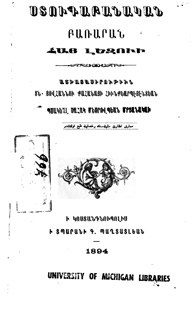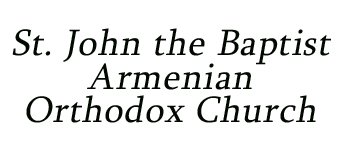DEATH OF REV. FR. HOVHANNES HUNKEARBEYENDIAN
December 28, 1894
 We know that Hrachia Adjarian was the author of the monumental 7-volume etymological dictionary of the Armenian language. There were prior attempts, one of them which belonged to a learned priest in Constantinople, Rev. Fr. Hovhannes Hunkearbeyendian.
We know that Hrachia Adjarian was the author of the monumental 7-volume etymological dictionary of the Armenian language. There were prior attempts, one of them which belonged to a learned priest in Constantinople, Rev. Fr. Hovhannes Hunkearbeyendian.
The future dictionary author was born on November 25, 1818, in the Ottoman capital. His given name was Tateos. His father was also a priest and called Hovhannes Hunkearbeyendian too. He was educated at the school of the Armenian Cathedral of Constantinople. His Armenian teacher was Krikor Peshdimaljian, a well-known educator and author of a dictionary and various grammars of the Armenian language.
Hunkearbeyendian was a teacher in various Armenian schools of Constantinople in the neighborhoods of Gedikpasa, Haskeuy and Pera (nowadays Beyoglu). He married in 1849 and Patriarch Hagopos Seropian (1839-1840, 1848–1856) consecrated him priest in 1852.
He learned Greek and later Persian and Latin. He started working in the study of Armenian etymology. In 1864 he was sent to Paris by the imperial government as supervisor for the students who were sent by the government or studied there with government scholarships. He returned to Constantinople in 1876 and continued his etymological studies.
He was regarded as the most knowledgeable person in the Greek language among the Armenian community and he was entrusted for two years to do a comparative study of the Armenian Bible with the Greek original. His study led him to the compilation of an Armenian Etymological Dictionary, but its publication was delayed due to his long illness. It was finally published in 1894. Unfortunately, he passed away shortly thereafter, on December 28, 1894.
Despite the author’s knowledge of Armenian, as well as the abovementioned languages, the dictionary was harshly criticized by its shortcomings, especially the lack of scholarly method and the absence of any linguistic rules. Hunkearbeyendian tended to explain the origin of words through apparent phonetic or semantic similitude, without trying to find linguistic rules that could possibly offer grounds for his hypothesis.
His dictionary today is nothing more than a linguistic curiosity.


